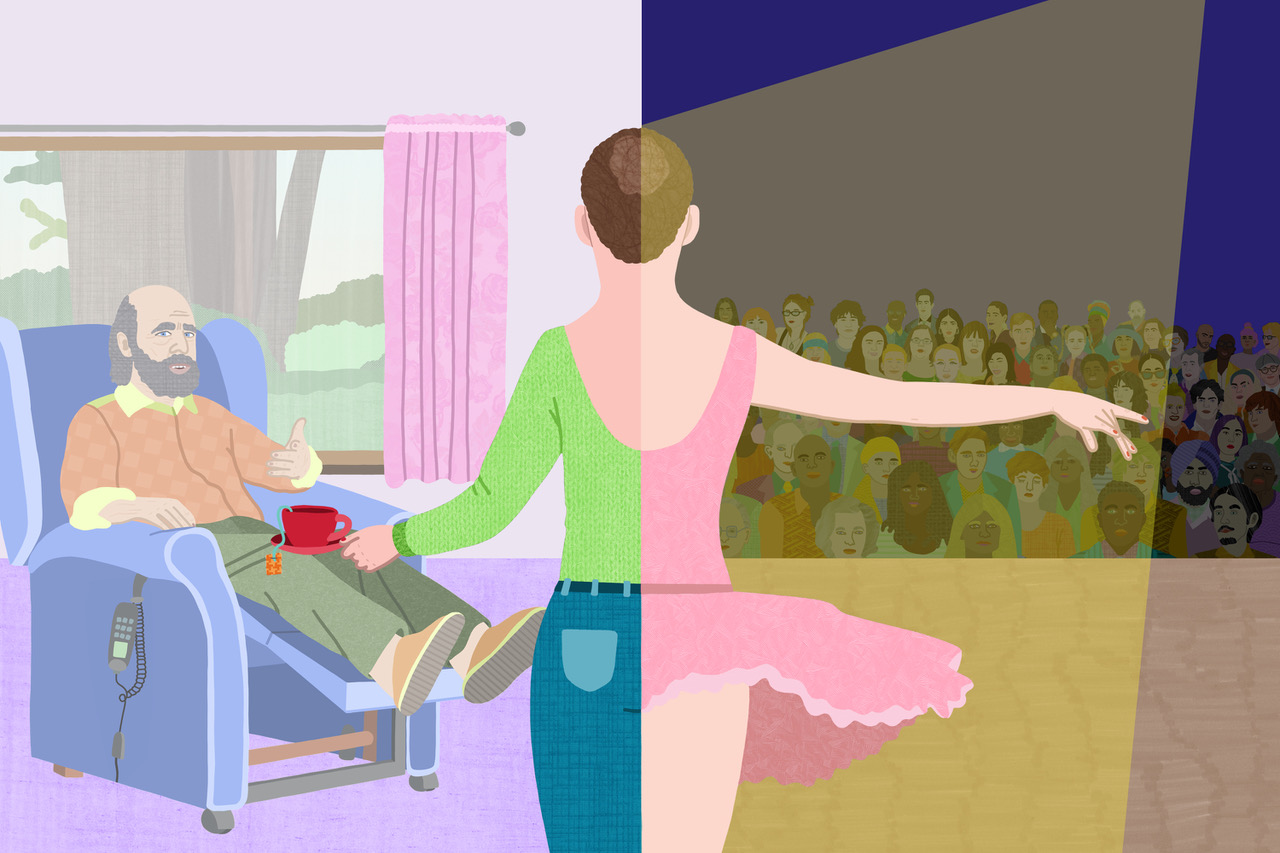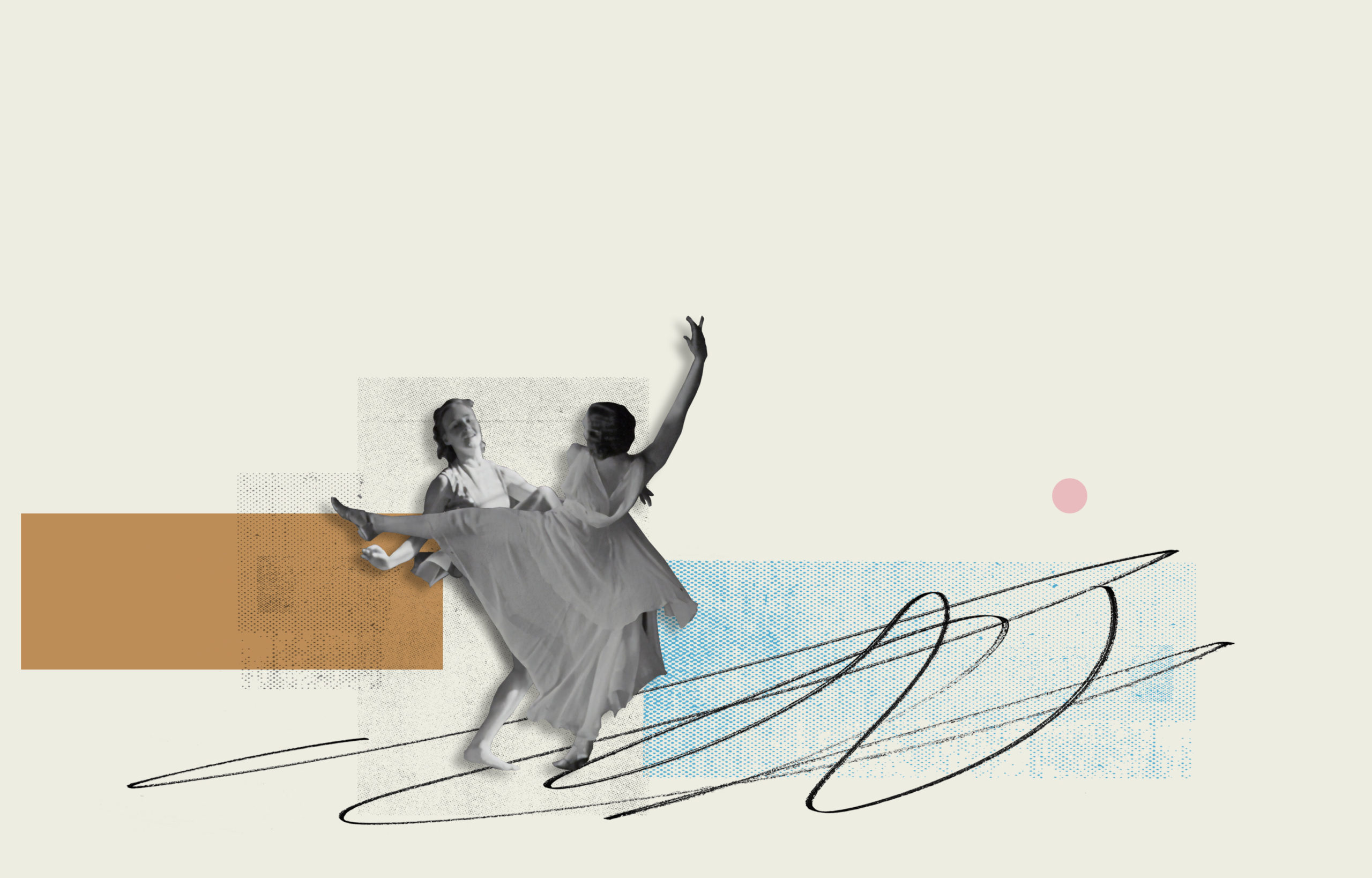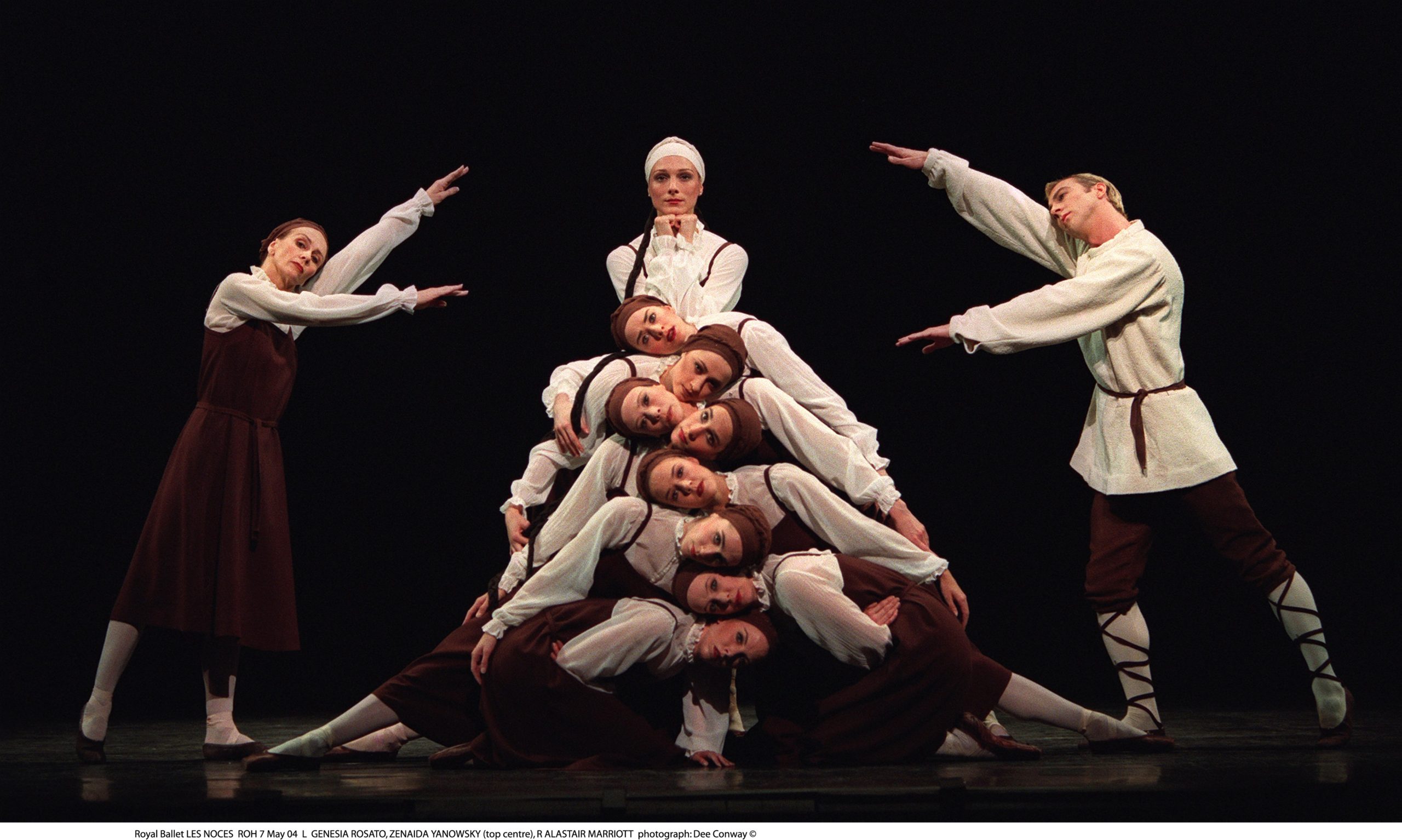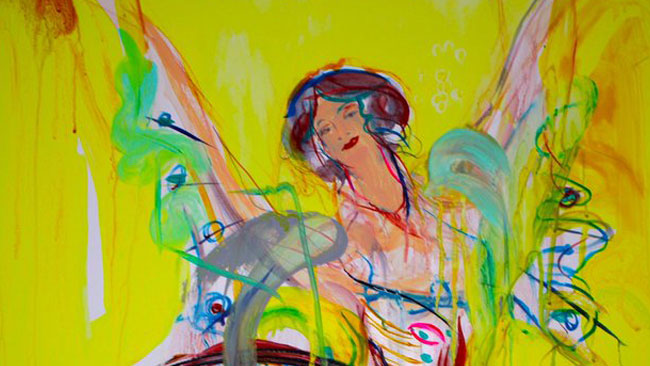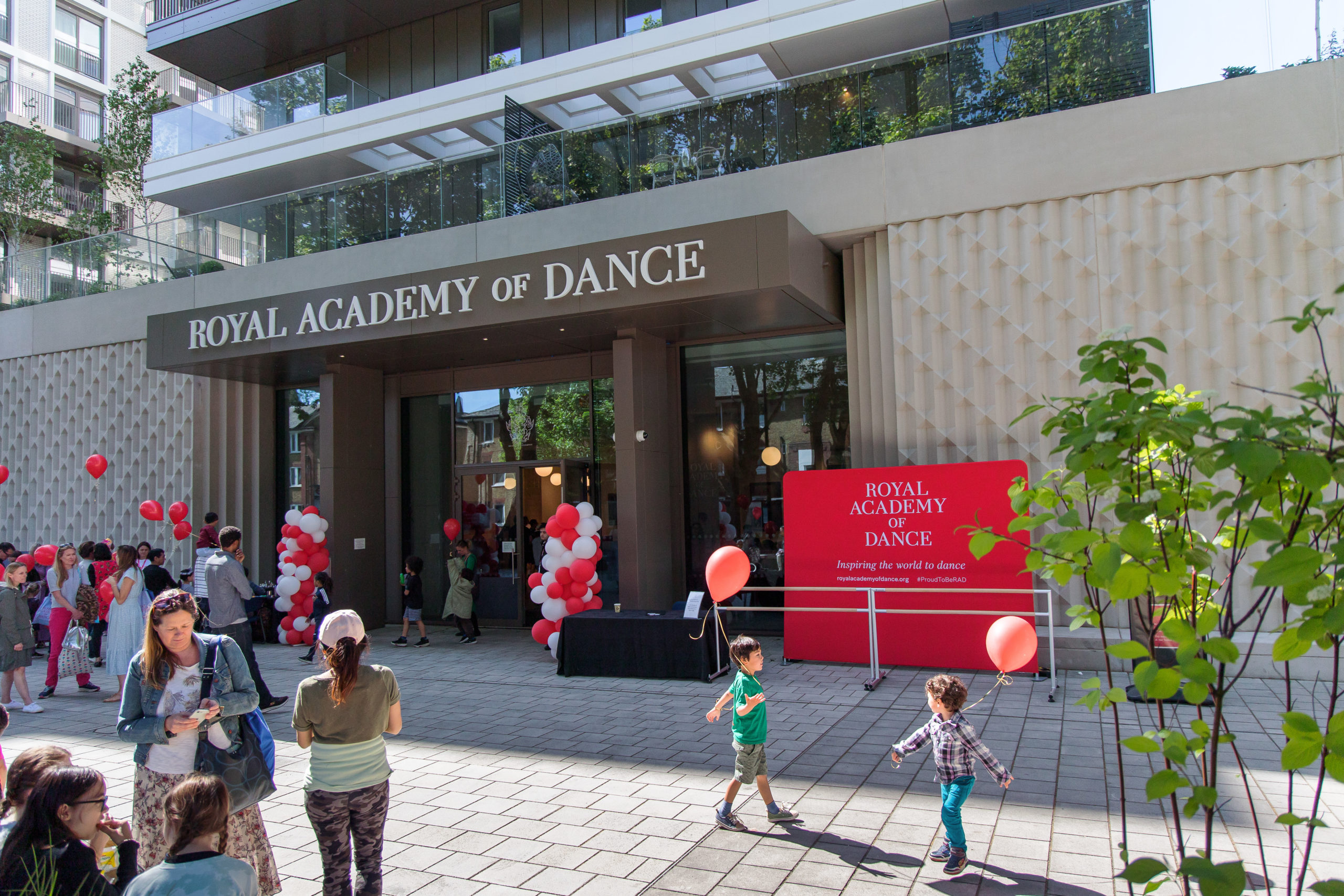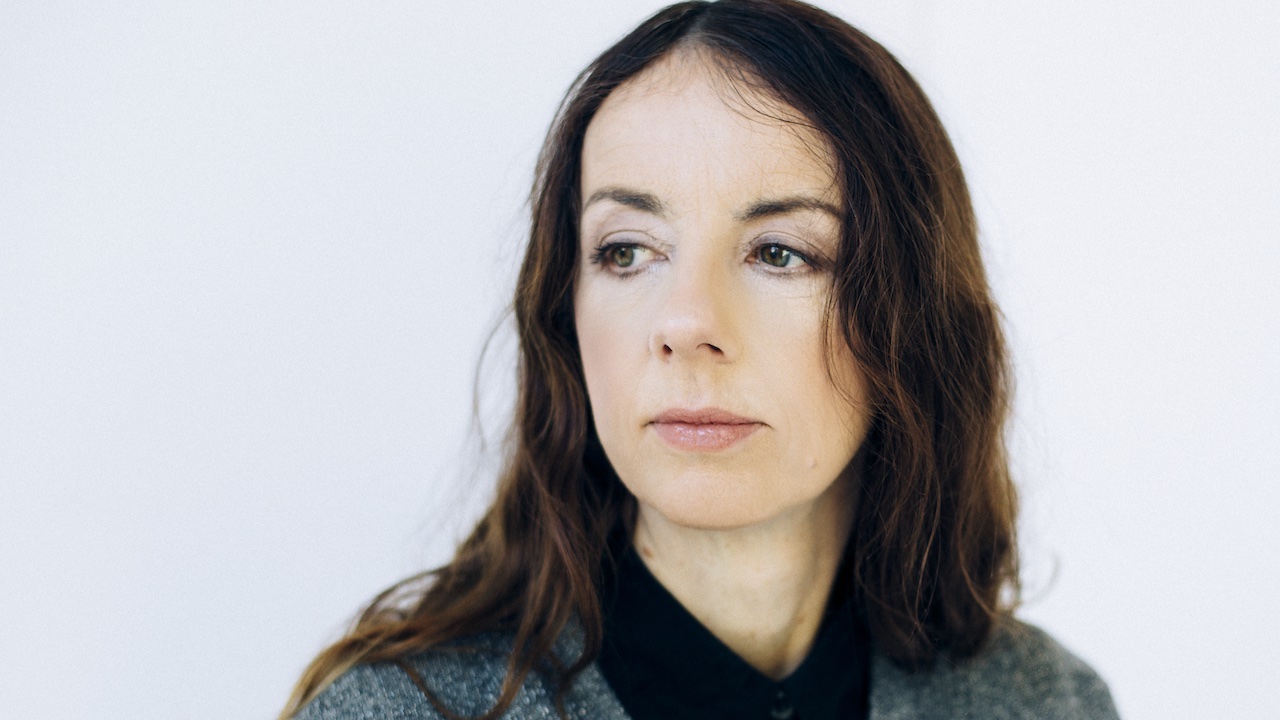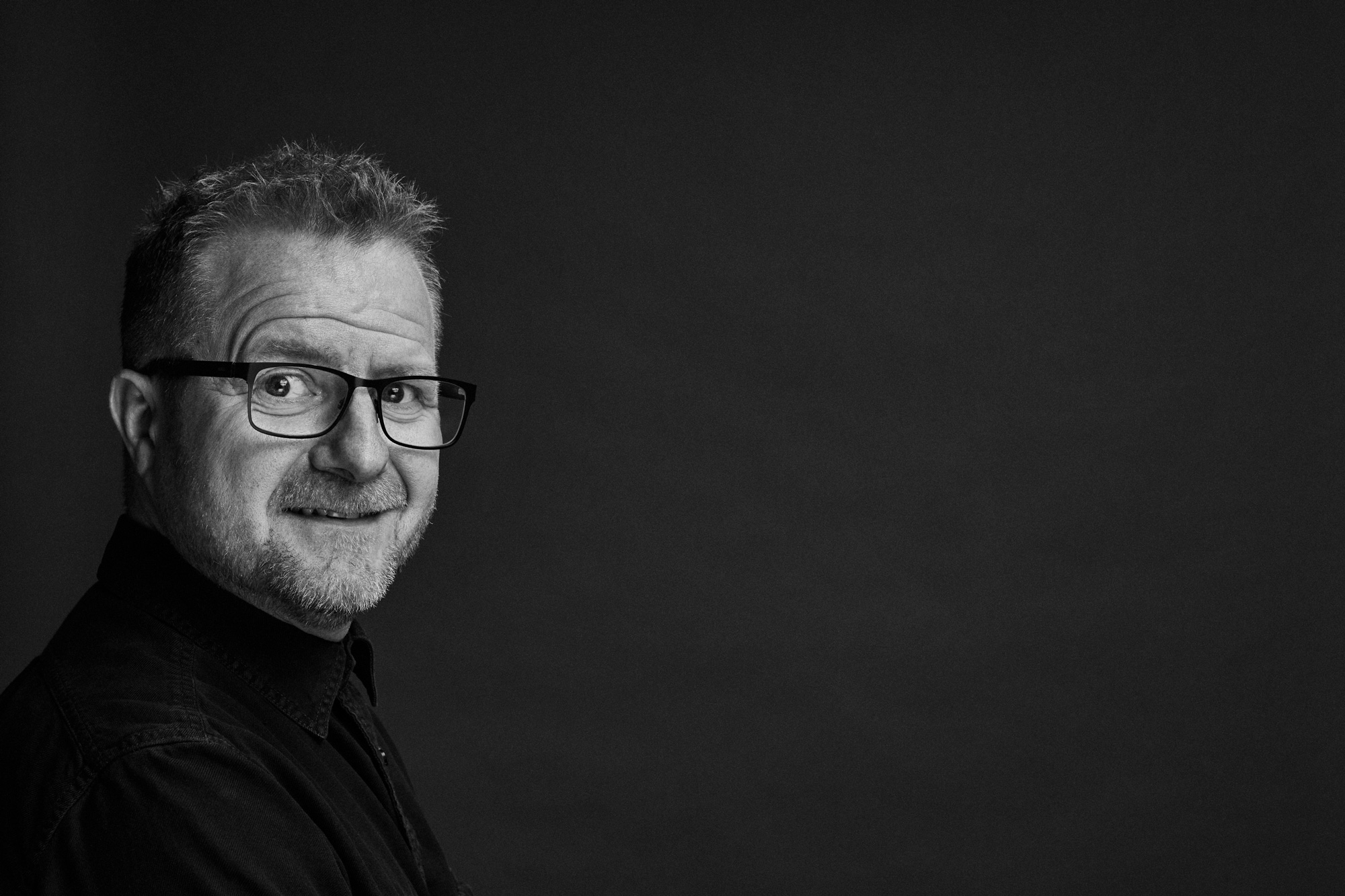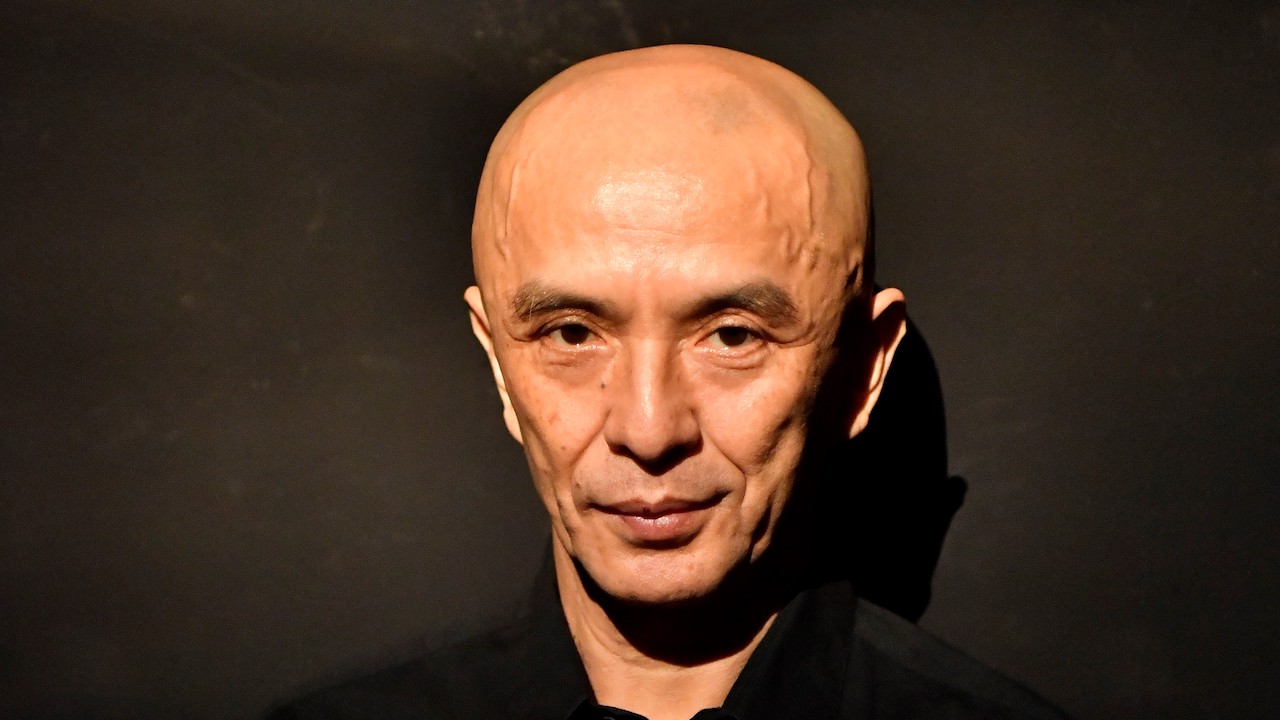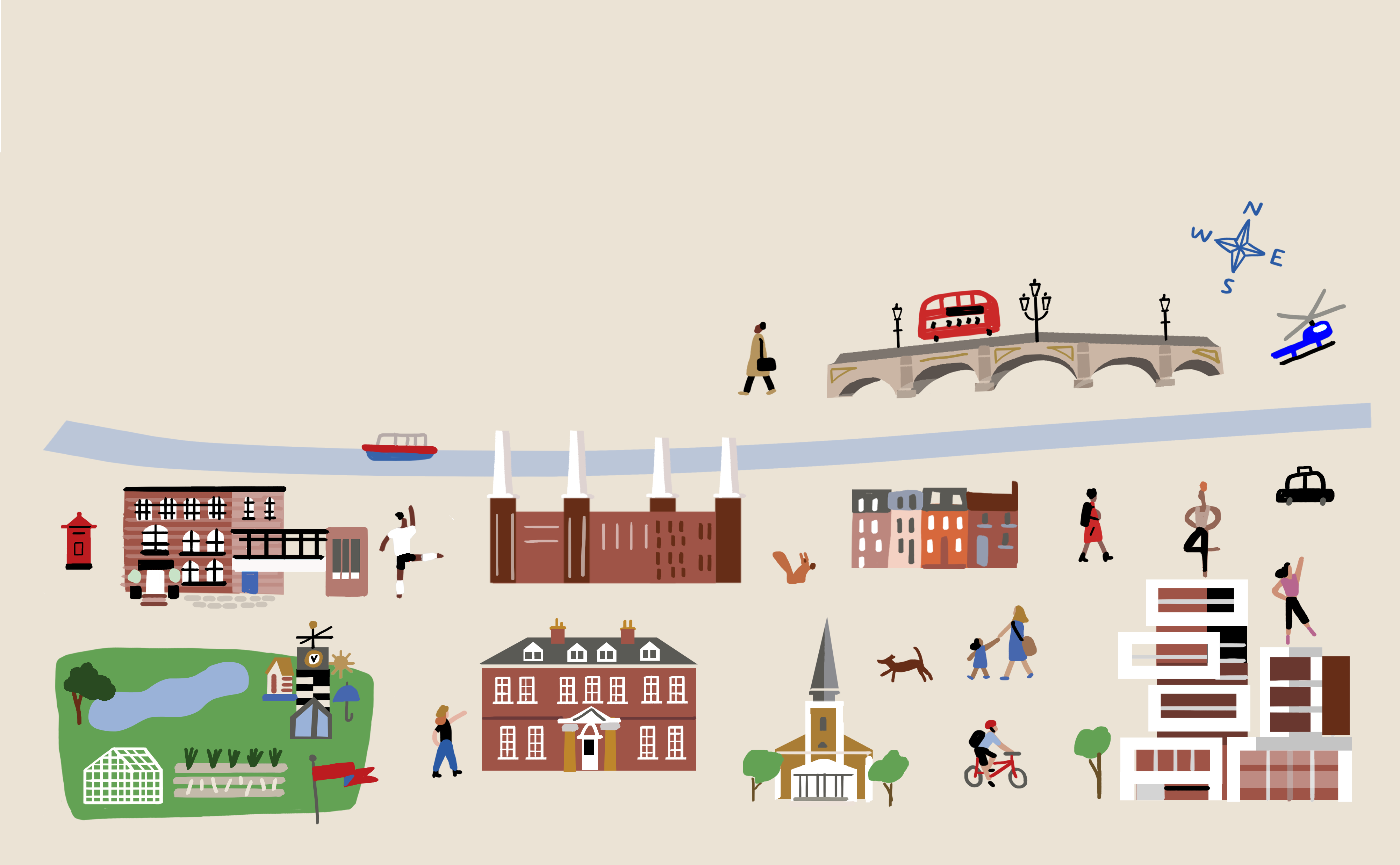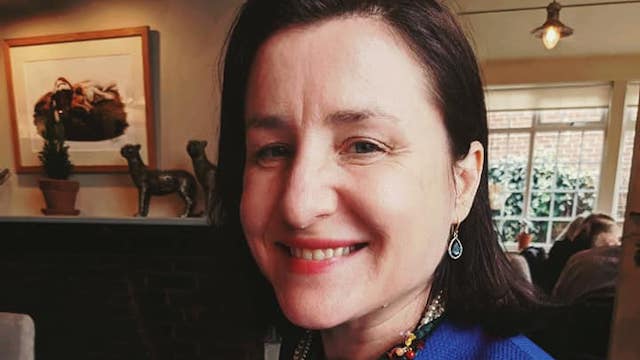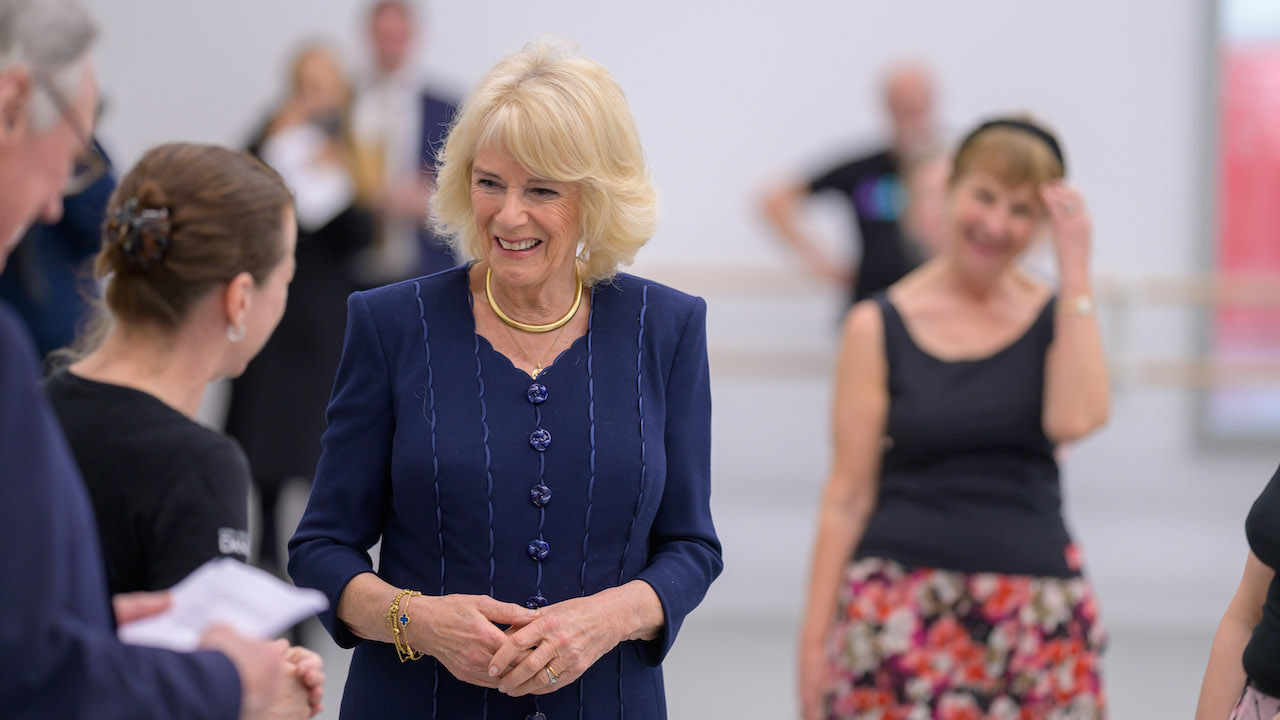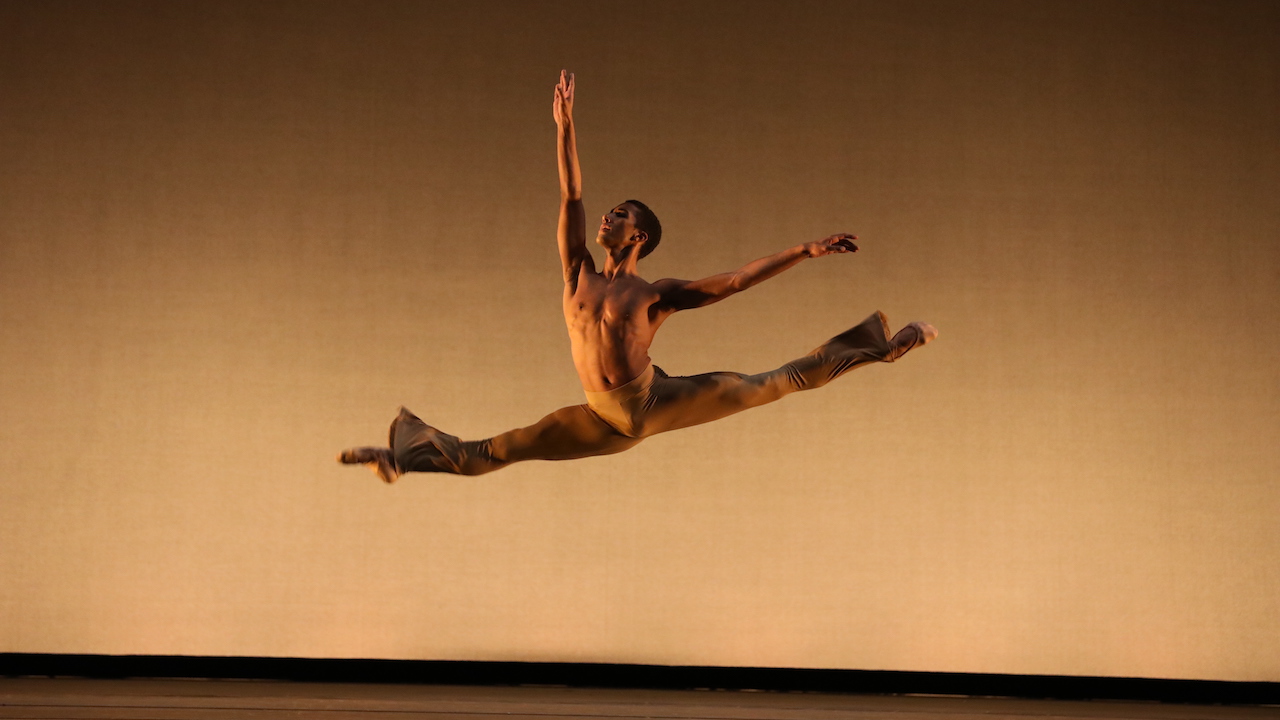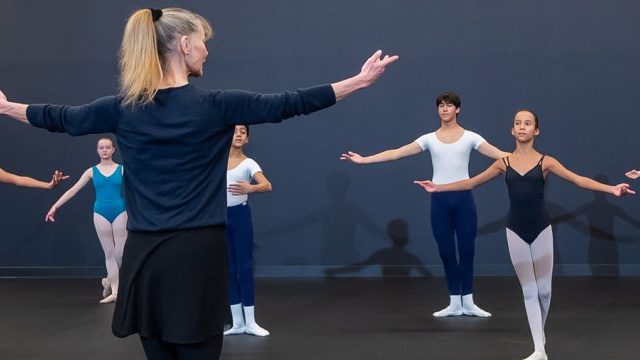When Etta Murfitt’s mother died of ovarian cancer in 2005, her father, Dennis, moved into her family home, along with her husband, Petrus and daughter Isobel. ‘It was great,’ Murfitt says, ‘because my daughter was eight and Dad was a very fit 80 year-old. He’d pick her up from school and cook dinner.’ Murfitt, who is Associate Artistic Director of New Adventures and a dancer and choreographer with a career spanning more than 40 years, refers to him as ‘Isobel’s carer for a good four years,’ adding, ‘he was amazing. There’s something wonderful about a young person talking to a really old person about their experiences, having funny political debates and finding out what life was like.’
Then, when her father was around 88, things started to shift. Dennis contracted a urine infection and serious dehydration and hallucinations followed. Murfitt found her father at home in a ‘sort of trance’. He spent six weeks in hospital, also contracting pneumonia. ‘It all sort of escalated from there,’ Murfitt says. In hospital, Dennis became more confused; when he came home, Murfitt struggled to secure a care package from her local council.
Then her father had another fall. In hospital again, doctors found that Dennis had suffered several mini strokes. Once again he contracted pneumonia in hospital; once again she found it difficult to secure care. Increasingly fragile, Dennis could barely be left alone. The uncertainty began to take its toll on Murfitt’s family life – and her work. She has collaborated on many of Matthew Bourne’s celebrated New Adventures productions. ‘I’d be away for four nights working on a show, constantly worried about what was going to happen.’ Dennis had bonded well with one carer during his last hospital stint, and Murfitt asked her to care for him five days a week. ‘My dad was quite dapper: clean shirt, clean shave. But he would never let me help him with anything like that, so this carer was great.’
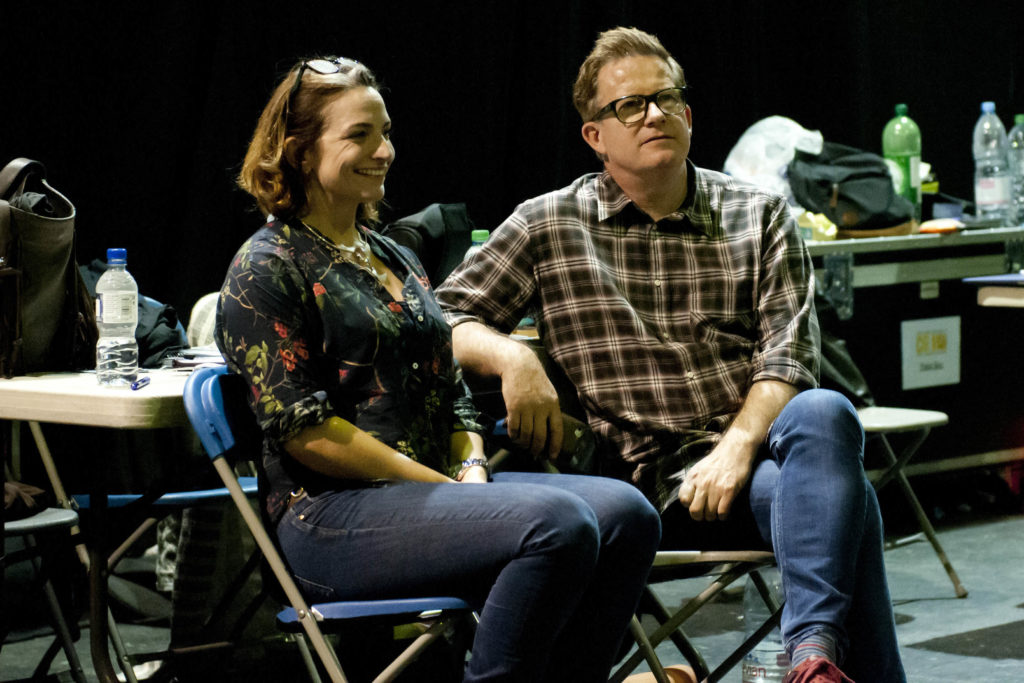
Just when Murfitt’s family routine seemed to stabilise somewhat, her husband Petrus, who taught at the Central School of Speech and Drama in London, died suddenly of a heart attack in 2014. ‘That threw everything up in the air again. My carer had her own family situation so couldn’t look after my Dad, and we were all grieving. My dad especially, felt as if the loss of Petrus was catastrophic. He kept saying, “it should have been me.”’ Murfitt recalls that her anxiety was through the roof: ‘I was desperate. An amazing woman, who was in a senior position at the council, came to the house. She saw how I was barely functioning. Thankfully she arranged more care.’
Dance can be an unsparing career, whether performing, teaching or studying. It demands long hours and dedicated regular practice – but these can be difficult to balance with an equally demanding home life. Murfitt is honest about how both grieving for a tragic loss and working in the arts impacted her ability to source proper assistance. ‘It is so difficult to know what to ask for,’ she says. ‘I work for a dance company and I was away all the time so the level of care I needed wasn’t really predictable. They’d ask “you need care overnight?” And I’d say no, just one or two nights this week, then nothing next week. People didn’t get it.’
Penny Cotton, Head of Global Membership Services at the RAD, notes that the RAD is particularly attuned to these pressures for dance teachers and students who are also carers, and have put in a number of measures to support them. ‘We launched the requirement to participate in Continuing Professional Development (CPD) in 2013 and felt it was important to recognise that registered teachers have commitments outside of their dance teaching careers. CPD activities can be accessed in-person or online, ensuring teachers from all over the world have the opportunity to connect with their fellow teachers,’ she notes.
For teachers who have onerous caring duties, Cotton explains they can apply for full and part exemptions each CPD year. There’s also a Teachers’ Hardship Fund, introduced in 2016, to support teachers financially with their annual membership subscription, and the RAD Teacher category, for professionals who may need to take a break from dance teaching, but want to stay connected to the RAD, as well as the Wellbeing Toolkit for teachers and students, which provides mental and physical health resources.
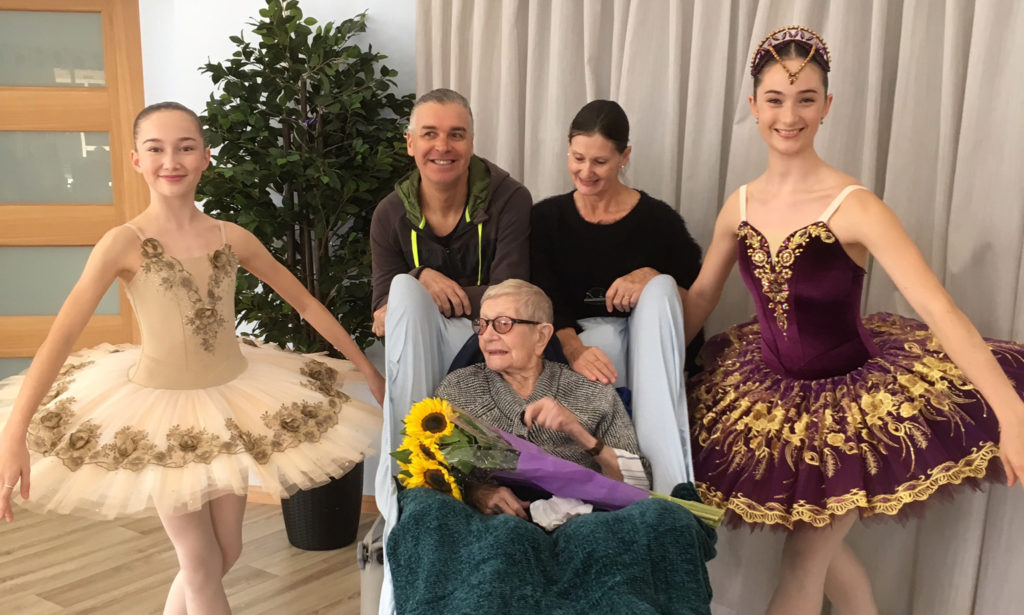
‘I never wanted to be seen as a carer. It just seemed to be part of daily life’
Deborah Preece-Brocksom
‘I have never wanted to be seen as a carer,’ says Deborah Preece-Brocksom, an RAD teacher and co-director of the Dance Centre, Peregian Springs in Queensland, Australia. ‘What I do just seems like family to me.’ Caring is nonetheless what she has done – for her friends and mentors Jacqueline (known to all as Jonnie) and Jack Floyd, former stars of the variety stage.
‘Jack and Jonnie were known in the dance world as Floyd and B’Nay,’ Preece-Brocksom explains. ‘They danced in the first television broadcast from Crystal Palace and danced in a Royal Command performance where the king remarked “this is the second time I’ve seen you two dance this week!” – he had also seen them in a West End show. They were very prominent in the RAD organisation of Australia, and when my husband Richard and I came to Australia they saw a newspaper article about us and asked us to dinner. From there an extraordinary friendship blossomed, that turned into a family.’
Like Preece-Brockman, Floyd and B’Nay were British born. ‘Although decades apart, we had almost the same British RAD upbringing,’ she recalls, ‘and as dancers we had so much in common as we had danced in so many of the same theatres, even remembering the same awful dressing rooms!’ They began meeting for lunch every Sunday – Preece-Brockman relished their stories of performing with Judy Garland and Michael Jackson, and ‘they helped me tremendously with running a dance school incorporating the RAD system.’
As the years passed, the weekly visits increased, to give the couple the extra help they needed. They had no children and ‘a strong love between us all had grown and flourished, the passion for dance and dance teaching being the bond that tied us together,’ says Preece-Brockman. ‘When the time came that they needed serious help,’ says, ‘a small cottage/unit was built where our vegetable plot used to be in our side garden as Jack said he needed more space to tap dance!’ Soon ‘caring just seemed to be part of daily life.’
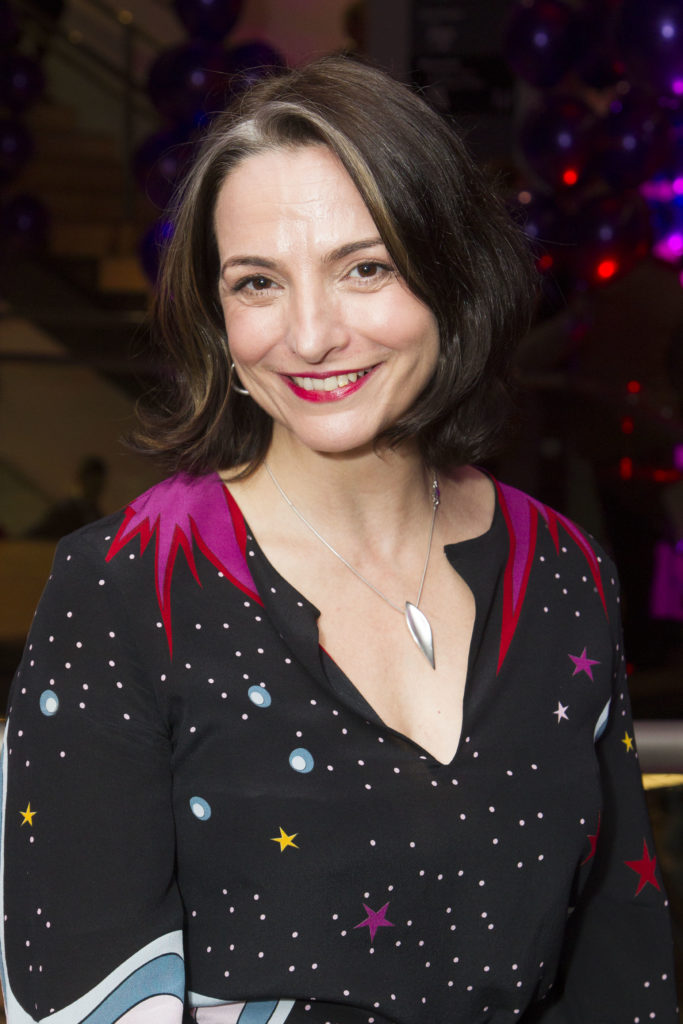
‘I can’t tell you how awful it is, to close the door on somebody you love and worry about them all day’
Etta Murfitt
It was nonetheless a demanding routine – getting up soon after 5am each morning to prepare breakfast and medicine, and ending late with a shared sherry and supper, and in between the school’s schedule of classes. Jack died aged 102, still eager to hear about Preece-Brockman’s talented students, and Jonnie was 96 when she died in March this year. ‘I don’t think I could ever have managed the caring if I had not had my ballet teaching each day,’ Preece-Brockman considers, ‘to help calm and balance my mind and refresh my soul. Seeing ones loved ones slowly die is quite soul destroying. I find that teaching young exuberant students, especially our Vocational students, is balm for my heart and mind.’
Although the worlds of dance and care can seem very far apart, Akeino James, studying dance at Kingston University in the UK, choreographed a final degree piece based on his own experience as a carer. ‘I had to help take care of my little brother, who is three years younger than me,’ James, now 22, said in a university news article. ‘I would be left while mum worked and had to make sure he had done his homework. I had a lot of responsibility but we’ve since realised that this only made us closer.’
His mother also encouraged him to explore dance. ‘I’ve never been really good at talking so being able to dance and express things without words has always been important to me,’ he said. ‘I like to share my ideas with people, I want those with similar experiences to myself to know that you can do other things.’ Reflecting on being a carer, he considered, ‘you might have more responsibilities than your friends, but you will be better for it in the end. You are not alone – you can do anything you want if you put your mind to it.’
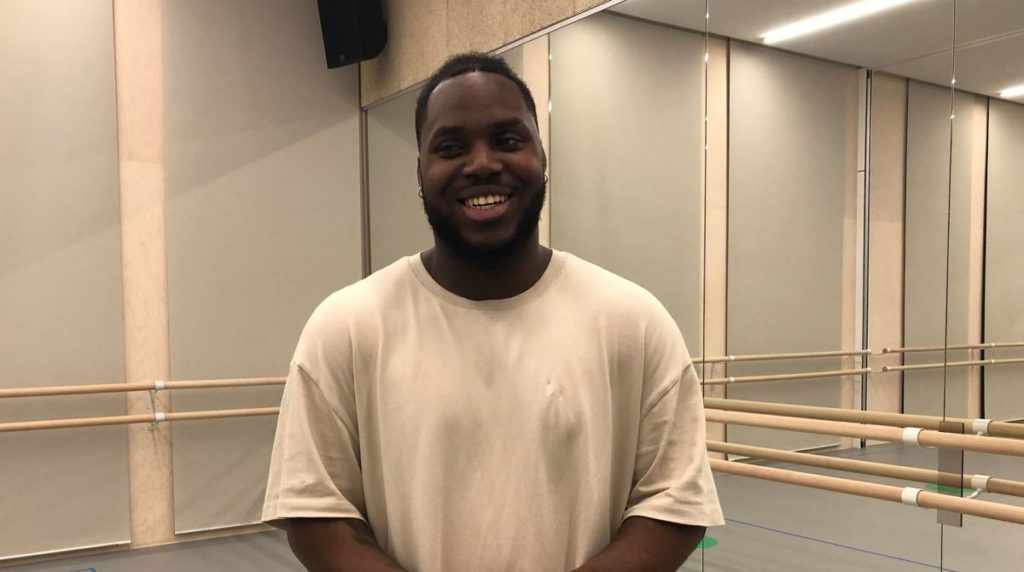
While looking after her father, Murfitt received support from New Adventures, which she calls ‘a brilliant company.’ She was often working far from her London base – ‘they let me just get the show on, then go home. That was really useful,’ she recalls. But Murfitt still lived with a permanent sense of trepidation while working away from her father. ‘I can’t tell you how awful it is, to close the door on somebody who you love very much and worry about them all day, thinking that something might happen to them – and also getting phone calls because my dad had a personal alarm and he’d press it by accident. It was a lot.’ When Dennis died in 2016, Murfitt describes feeling overwhelmed by a sadness that was also laced with a sense of relief: it still feels confusing.
More support needs to be readily available to freelancers and creatives during family crises, Murfitt says. ‘You need somebody to explain what your options are, but also understanding from performing arts companies themselves,’ she says. ‘If someone has a caring situation, they need cover. There may be many carers who want to perform, but can’t be away from home for long periods of time. What we need is flexibility. There’s not very much protection for freelancers, apart from a company’s goodwill.’
What, if anything, does Etta Murfitt think she learned about herself during a period fraught with grief and anxiety, but also much joy? ‘I learned that talking to others to help work out what’s going on is so important. And that even when I’m anxious I can still operate and do my job.’ She pauses. ‘And also, that I still really loved my Dad even when I was caring for him. Even though it was really stressful, he still made me laugh so much.’
Georgina Lawton is the author of Raceless and Black Girls Take World. She also writes for the Guardian and others.
Ellis van der Does is a Dutch illustrator and designer based in London. ellisvanderdoes.com

